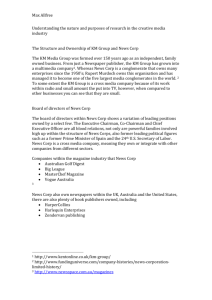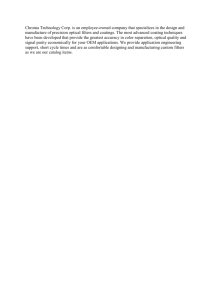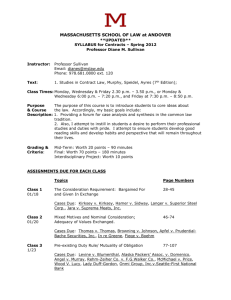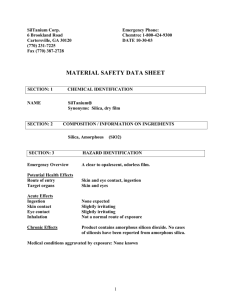Corporations Attack - Stanford Law School
advertisement
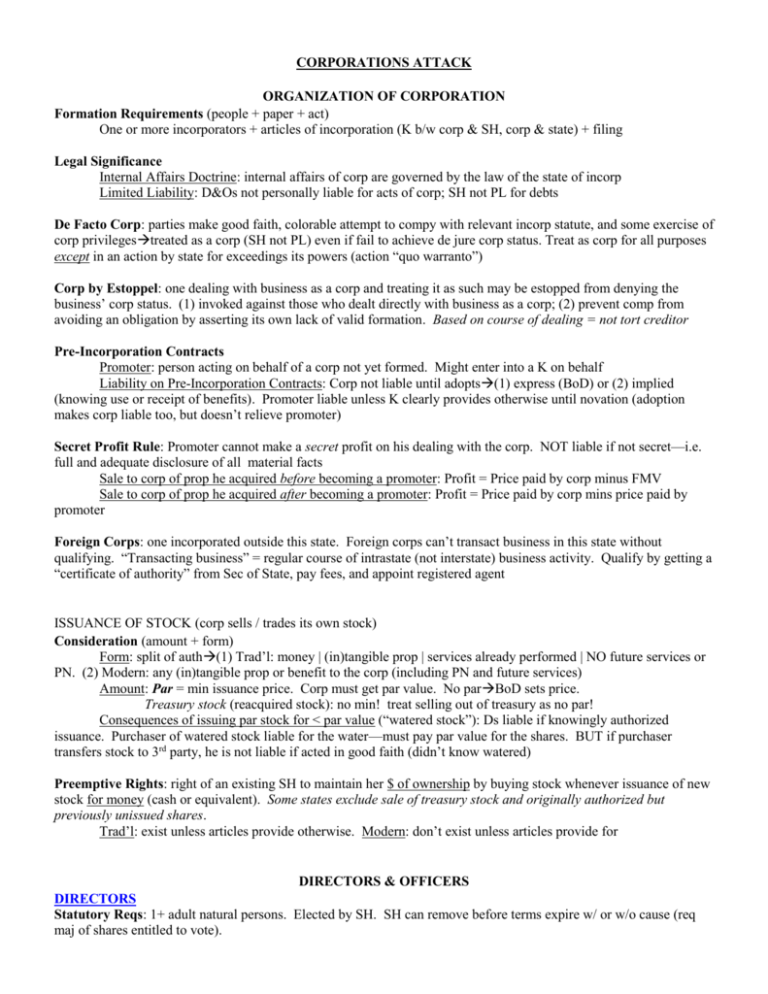
CORPORATIONS ATTACK ORGANIZATION OF CORPORATION Formation Requirements (people + paper + act) One or more incorporators + articles of incorporation (K b/w corp & SH, corp & state) + filing Legal Significance Internal Affairs Doctrine: internal affairs of corp are governed by the law of the state of incorp Limited Liability: D&Os not personally liable for acts of corp; SH not PL for debts De Facto Corp: parties make good faith, colorable attempt to compy with relevant incorp statute, and some exercise of corp privilegestreated as a corp (SH not PL) even if fail to achieve de jure corp status. Treat as corp for all purposes except in an action by state for exceedings its powers (action “quo warranto”) Corp by Estoppel: one dealing with business as a corp and treating it as such may be estopped from denying the business’ corp status. (1) invoked against those who dealt directly with business as a corp; (2) prevent comp from avoiding an obligation by asserting its own lack of valid formation. Based on course of dealing = not tort creditor Pre-Incorporation Contracts Promoter: person acting on behalf of a corp not yet formed. Might enter into a K on behalf Liability on Pre-Incorporation Contracts: Corp not liable until adopts(1) express (BoD) or (2) implied (knowing use or receipt of benefits). Promoter liable unless K clearly provides otherwise until novation (adoption makes corp liable too, but doesn’t relieve promoter) Secret Profit Rule: Promoter cannot make a secret profit on his dealing with the corp. NOT liable if not secret—i.e. full and adequate disclosure of all material facts Sale to corp of prop he acquired before becoming a promoter: Profit = Price paid by corp minus FMV Sale to corp of prop he acquired after becoming a promoter: Profit = Price paid by corp mins price paid by promoter Foreign Corps: one incorporated outside this state. Foreign corps can’t transact business in this state without qualifying. “Transacting business” = regular course of intrastate (not interstate) business activity. Qualify by getting a “certificate of authority” from Sec of State, pay fees, and appoint registered agent ISSUANCE OF STOCK (corp sells / trades its own stock) Consideration (amount + form) Form: split of auth(1) Trad’l: money | (in)tangible prop | services already performed | NO future services or PN. (2) Modern: any (in)tangible prop or benefit to the corp (including PN and future services) Amount: Par = min issuance price. Corp must get par value. No parBoD sets price. Treasury stock (reacquired stock): no min! treat selling out of treasury as no par! Consequences of issuing par stock for < par value (“watered stock”): Ds liable if knowingly authorized issuance. Purchaser of watered stock liable for the water—must pay par value for the shares. BUT if purchaser transfers stock to 3rd party, he is not liable if acted in good faith (didn’t know watered) Preemptive Rights: right of an existing SH to maintain her $ of ownership by buying stock whenever issuance of new stock for money (cash or equivalent). Some states exclude sale of treasury stock and originally authorized but previously unissued shares. Trad’l: exist unless articles provide otherwise. Modern: don’t exist unless articles provide for DIRECTORS & OFFICERS DIRECTORS Statutory Reqs: 1+ adult natural persons. Elected by SH. SH can remove before terms expire w/ or w/o cause (req maj of shares entitled to vote). Board Action: only TWO ways the BoD can take valid act(1) unanimous written consent to act without a meeting, OR (2) a meeting that satisfies quorum and voting reqs. If neither, then act is void unless later ratified by a valid corp act. Quorum: maj of all Ds to do business (unless diff % in bylaws)if quorum present, passing a resolution requires only a maj of votes present. Quorum broken if Ds leave! Role: BoD manages business of corp (big picture stuff). Can delegate substantial management functions to a committee, but it can’t amend bylaws/declare dividends/recommend fundamental corp change to SH Duty of Care Standard: D owes the corp a duty of care as a matter of law. He must act in good faith and act as an ordinarily prudent person under similar circumstances (with regard to his own business) Nonfeasance: D does nothingliable only his breach causes harm to the company (causation!) Misfeasance: BoD does something that hurts corpNOT liable is meets BJR Business Judgment Rule (“exercise informed decisionmaking in good faith”) A court will not second-guess a business decision if it was made in good faith, was informed, and had a rational basis. Duty of Loyalty Standard: D owes the corp a duty of loyalty. He must act in good faith and with a reasonable belief that what he does is in the corp’s best interest. Interested Director Transaction: will be set aside UNLESS D shows(1) deal was fair to the corp when entered, OR (2) his interest and the relevant facts were disclosed or known + deal was approved by either a maj of disinterested Ds or maj of disinterested shares. Fair when made PR disclosure + approval! Competing Ventures: D must act in the best interest of corp = canNOT compete directly with her corp. Remedy: constructive trust on profits and possibly damages for harm to corp Corp Opportunity (Expectancy): D cannot usurp a corporate opportunity = D can’t take it until he (1) tells the BoD—disclosure + (2) waits for BoD to reject the opp. Remedy: D has it, must sell it to corp at his cost. If sold it at profit, corp gets profit (constructive trust). Corp opp = anything the company could reasonably be expected to be interested in Ultra Vires Acts: Responsible D&Os are liable for ultra vires losses (if go into ultra vires activity and lose money, on the hook!). Remember: if takes act beyond scope of the articles, then K is still valid and enforceable BUT SH may seek injunction. Improper Loans: no clear maj view(1) loan must be approved by majority of shares. (2) clear modern trend—loans OK if BoD finds that it’s reasonably expected to benefit the corp. Sarbanes-Oxley: prohibits most loans to execs in registered, publicly traded corps Which Ds are Liable: D is presumed to have concurred with BoD action unless her dissent/abstention is noted in writing in corp records = (1) in the minutes; (2) in writing to corp secretary at mtg; or (3) registered letter to corp secretary immediately after mtg. Oral dissent is NOT enough!!! Exceptions: (1) absent directors not liable (some states require dissent in writing after learning of BoD action); (2) good faith reliance on book value of assets prepared by CFO | opinion of competent EE/officer/prof/ comm.. of which relying D not member | financial stmts by auditors. Reasonable belief in competence of persons providing such info!!! OFFICERS Same Duties of Care and Loyalty as Ds Status: agents of corp = can bind the corp by acts for which they have authority to bind it Actual authority: given in artices, bylaws, or BoD act Apparent authority: corp holds officer out as having authority to bind it, so 3rd parties rely Inherent/Implied authority: by virtue of the office held (prez has inherent auth to enter Ks binding on corp) Selection and removal: by BoD, not SH. Directors also set officer comp. BoD can remove officer if lose faith in hia ability to run corp, but will have to cut a check (typically sue for enforcement of employ’t agmt) INDEMNIFICATION OF D&Os Indemnification: persons sued in capacity as D or O has incurred costs/attys fees/fines/judgment/settlement, and seeks reimbursement from the corp. Sued in representative capacity as D/Oreimbursement claim No indemnification: corp barred from indemnifying when D/O is (1) held liable to the corp, or (2) held to have received an improper personal benefit. MUST have finding of liability! Against public policy to reimburse Mandatory indemnification: corp required to indemnify Some states: if D was “wholly successful” (on the merits or otherwise) in defending an action Others: to the extent D was successful Permissive indemnification: corp permitted to indemnify(1) anything not satisfying bar or requirement of indemnification (i.e. settlements!!!); (2) eligibility standards determined by disinterested Ds or disinterested shares or independent legal counsel (D must show acted in GF + w/ reas belief that actinos were in corp’s best interests) Court Order: ct where D/O was sued can order indemnification if it’s justified in view of all the circs (usually limited to costs and attys fees) Articles: can provide for limitation or elimination of liability for damages, but NOT for breach of duty of loyalty, intentional misconduct, or wrongful personal benefit. i.e. can eliminate for honest GF mistake in judgment SHAREHOLDERS SHAREHOLDER AS DEFENDANT (Generally, SH not liable for acts/debts of corp) But ct might pierce the corp veil (PCV) and hold SH personally liable if (1) they’ve abused the privilege of incorporating, and (2) fundamental fairness requires it. PCV Standard: most cts will PCV to avoid fraud or fundamental fairness (never automatic) Alter Ego (identity of interests): commingling of funds or failure to observe corporate formalities (SH treats corp as his alter ego by treating the corp and his personal assets as interchangeable). Failure to respect the separateness of the corp. Must be SERIOUS failure, not just sloppy admin Undercapitalization: SH fail to invest enough to cover prospective liabilities = undercapitalized when formed Courts are generally more willing to PCV for a tort victim than for a K claimant. Related Corp Situation: parent corp forms sub to avoid obligationscreditor of parent not getting paid. Court will PCV to get to sub’s assets. SHAREHOLDER AS MANAGER (Public policy says BoD and not SH manages a corp) Closely Held Corporation = few SH + shares not publicly traded: SH can manage a corp directly heremust be a unanimous SH agmt that provides for SH management. In some states: statement in articles to that effect. This means corp need not have a BoD. Managing SH owe duties of care and loyalty. Clear trend: SH in a close corp owe each other fiduciary duties (watch for controlling SH oppressing) Professional Corp: SH must be licensed profs and generally it may practice only one profession. Remain personally liable for their own malpractice/misconduct, BUT generally not liable for each other’s SH AS PLAINTIFF (Derivative or Direct Suits) Derivative suit: SH suing to enforce the corp’s claim, not his own personal direct claim. ASK: could the corp have brought this suit? Consequences of success: recovery in derivative suit goes to corp. SH may receive costs and atty’s fees, usually from the corp (conferred benefit to it) Exception: sometimes ct may allow SH to recover directly if a recovery by corp would simply return $ to the bad guys Consequences of failure: SH canNOT recover costs and attys fees. SH LIABLE to D for its costs and attys fees IF SH sued without reasonable cause Requirements for Derivative Suit Contemporaneous stock ownership: SH must have owned stock at the time the claim arose OR have gotten it by operation of law (inheritance/divorce decree) from someone who did own stock when claim arose. MUST own the stock throughout the litigation. Standing: must adequately represent the interest of the corp Written demand: must make a written demand on Ds that the corp bring suit UNLESS demand would be futile Plead with particularity: e.g. why written demand is futile Post security bond for costs: (some states) to avoid strike suits Corporation (BoD or committee) can move to dismiss: if disinterested Ds find it’s not in the corp’s best interest (low chance of success or cost of litigation would exceed recovery). Some states: the court will also scrutinize the process used and make an independent determination of whether dismissal is in the corp’s best interest. Litigation: corp must be joined initially as a defendant No dismissal or settlement without court approval: ct can give notice to those who would be affected, and get their input on whether dismissal or settlement should be approved. SHAREHOLDER VOTING General Rule: the record SH as of record date has the right to vote Record SH: the person shown as the owner in the corporate records. The record date is a voter eligibility cutoff. Exceptions: (1) the corp does not vote treasury stock even if it was the record owner not he record datate (shares held in treasury do not vote); (2) if SH dies, SH’s executor can vote the shares even if executor wasn’t record owner on record date; (3) proxies Proxy: a writing signed by record SH directed to secretary of corp authorizing another to vote the shares Rule on duration: proxy good for 11 months!!! Revocation: “the law favors the free revocability of proxies” = SH can revoke her proxy even though it states it’s irrevocable Irrevocability: “Proxy Coupled with an Interest” (1) Irrevocable on its face + (2) Proxyholder has some interest in the shares other than the mere interest in voting = (i) beneficial owner even if not record owner | (ii) option to purchaser the shares | (iii) pledge on the shares in connection with a loan Voting Trusts & Voting Agreements (block voting) Requirements for voting trust: (1) written trust agmt controlling how shares will be voted; (2) give copy to corp; (3) transfer legal title of shares to voting trustee; (4) OG SH typically receive trust certificates and retain all SH rights except voting. Max duration is 10 yrs!!! Requirements for voting (pooling) agreement: K (signed writing). Split of auth re: SPCL no, modern yes SH: Valid Corporate Act. 2 ways(1) unanimous written consent of the holders of all voting shares, OR (2) a meeting that satisfies quorum and voting rules Notice: must given written notice to every SH entitled to vote, for every meeting (annual or special) Contents: when + where +state the purpose (this is the only business that can be transacted at meeting) Failure to give proper notice: action taken at mtg is void unless those not sent notice waive the notice defect Express waiver: in writing and signed any time | Implied waiver: attend mtg w/o objection Quorum: must be a quorum represented at mtg# of shares represented, not # of SH. Generally, a quorum requires a maj of outstanding shares. SH quorum is NOT broken if people leave the mtg! Majority: if quorum req is met, maj can act to bind the corp unless the articles/bylaws require supermaj vote Trad’l: maj of shares present | Modern: maj of shares that actually voted on a particular proposal Cumulative Voting: only when electing directors. (# shares) x (# of directors to be elected) Exists inmost states only if articles provide. RIGHT OF SH TO INSPECT RECORDS Standing: Trad’l view(1) must have owned stock at least 6 months or (2) own at least 5% of outstanding shares. Modern: any SH! Procedure: written demand stating a proper purpose (related to role as SH). May be hostile to management If corp disallows after proper demand, SH can move for ct order + recover costs/attys fees incurred in making the motion. DISTRIBUTIONS (dividend, repurchase of stock or redemption) BoD Discretion: distributions are declared in BoD’s discretion. Can only win on a very strong showing of abuse of discretion (consistent profits + no dividend + BoD pays itself bonus) Preferred: pay first Participating: pay again Cumulative: add them up (a cumulative dividend accrues year to year) Source of Funds Earned Surplus: retained earnings, generated by business activity. ALL can be used for distribution Earned Surplus = all earnings – all losses – distributions previously paid Stated Capital: generated by issuing stock. NEVER used for distributions Par issuance: par value of issuance goes to stated capital No-Par: BoD allocates—if no allocation, all goes into stated capital Capital Surplus: generated by issuing stock. CAN be used for distrib if tell SH where $ is coming from Capital Surplus = payments in excess of par + amts allocated on a no-par issuance Nimble Dividend: paid out of current earnings when there is not sufficient surplus for a dividend When: corp can make distrib even tho it lost money previous yr BUT canNOT make distribution if it’s insolvent OR is the distrib would render it insolvent!!! Insolvency = unable to pay debts as they come due OR assets <M liabilities, including liquidation preferences (balance sheet insolvency) Directors: personally liable for unlawful distributions, as are SH who knew distribution was unlawful when received it. Only time on the bar exam you hold SH liable! Trad’l view: SLdirector liability is strict Modern: directors only liable if the distrib is made in breach of a duty (negligence)—remember possible defense of good faith reliance FUNDAMENTAL CORPORATE CHANGES Characteristics: require BoD action + approval by maj of share entitled to vote (absolute maj vote!) Right of Appraisal: right of a dissenting SH to force the corp to buy his shares at fair value. This may be SH’s exclusive remedy re: fundamental change unless fraud. Trigger: (1) merger or consolidation. (2) sell or transfer of substantially all assets not in the ordinary course of business. (3) transfer of shares in a share exchange. Perfection of Right: (1) b4 SH vote, file with corp written notice of objection and intent to demand payment. (2) abstain or vote v. proposed change. (3) after vote, make a written demand to be bought out Some states don’t grant the right of appraisal if stock is publicly traded. Amendment of the Articles: requires BoD action + notice to SH SH approval: requisite # is absolute maj (# of shares entitled to vote) If approved, file amended articles with sec of state No dissenting SH rights of appraisal, but class voting: if amendment harms class of stock, the amendment must be approved by the shares of that class itself as well as by absolute maj Mergers or Consolidations: requires BoD action of both corps + notice to SH SH approval: generally both corps. Absolute majority! Exception: no SH approval req in “short form” merger (90% or more owned sub merges into parent) If approved, file articles of merger or consolidation with sec of state. Dissenting SH right of appraisal: for SH of both corps in a regular merger. SH of sub in short-form Effect: surviving corp succeeds to all rights and liabilities of the constituent companies. Creditor of merged corp can sue survivor Transfer of All or Substantially All of the Assets No in Ordinary Course of Business, or Share Exchange Share exchange: one comp acquires all the stock of another fundamental corp change for the transferring corp only! BoD action of both corps + notice to selling corp’s SH Transferring corp’s SH approval: absolute maj vote Dissenting SH right of appraisal: for SH of transferring corp only Effect: corp acquiring assets is not liable for debts of acquired comp unless deal says otherwise, or unless the comp purchasing assets is merely a continuation of the selling corp Dissolution (corporate death) Voluntary: BoD resolution + approval by absolute maj Some states: unanimous written SH agmt Involuntary: judicially supervised ct order SH can petition: grounds(1) director abuse, waste of assets, misconduct | (2) director deadlock that harms the comp | or (3) SH deadlock and failure for at least 2 annual mtgs to fill a vacant board position Alternative: ct may order buy-out of the complaining SH (esp in close corp) Creditor can petition: corp is insolvent + credit either has an unsatisfied judgment v. corp or the corp admits debt in writing Effect: after filing articles of voluntary dissolution or after ct order of involuntary dissolution, corp stays in existence to wind up = (a) gathering all assets. (b) converting them to cash. (c) paying off creditors. (d) distributing any remainder to SH (recover pro-rata by share unless dissolution preference = just means pay 1st in the context of liquidation of corp) SECURITIES & RELATED TOPICS STATE LAW (CL) LIABILITIES Sale of Controlling SH: controlling SH = one w/ maj of shares or minority in a situation giving effective working controlcan sell her control bloc for control premium. CANNOT use his control to obtain a special advantage or to cause the corp to take action that unfairly prejudices the minority SH. Sale to Looters: CSH liable is he sells to looters w/o making a reas insvestigation of buyerliable for damage caused to corp, including amt looted + other harm (damage to earnings). What will put him on notice that buyer is looter(1) undisclosed principal, and (2) very high purchase price) Disguised Sale of Corp Asset: buyer pays premium to CSH to get to corp assetCSH has no right to sell a corp asset (all SH should share in the premium). Disgorge the premium!!! Sale of a BoD Position: fiduciary cannot get paid to relinquish position. Watch for SH selling control shares and then resigning from BoD along with her pals. Board seat is not CSH’s to sell = violates public policy to let her be paid for it. CSH Oppression: esp prob in close corpcts may protect minority SH since no public market for stock Fraud: CL fraud may apply to representations in the sale of stockallows suit by defrauded buyer or seller. This covers the overt lie (affirmative misrep), but not the half-truth or failure to disclose. Nondisclosure of “Special Facts”/Common Law Insider Trading: many cts impose upon D&Os affirmative duty to disclose “special facts” “Special Facts”: those a reasonable investor would consider impt in making an investment decision. Standing: those in privity = SH w/ whom the insider deals. Some say prospective SH may sue Measure of Damage: difference between price paid and the value of the stock a reas time after public disclosure Significant Minority View: corp can sue the insider to recover profits he made in market trading on inside info FEDERAL RULE 10b-5 (aimed at deceit/fraud) Rule: illegal to use any fraudulent scheme in connection with the purchase or sale of any security using an instrumentality of interstate commerce Elements: 1. Jurisdiction“Instrumentality of Interstate Commerce”: transaction must employ an instrumentality of interstate commerce (phone, mail, national exchange) 2. Possible Defendants: “any person” (human or entity!) a. Company that issues a misleading press release b. Buyer or seller of sec who misrepresents material info c. Buyer or seller of sec who fails to disclose material inside info when there is a duty to abstain or disclose (relationship of trust and confidence with SH of the corp) d. Tipper and tippee 3. Possible Plaintiffs: very narrow a. SEC b. Actual private buyer or seller of sec 4. Conduct: Possible “Bad Acts” by Defendant a. Fraud: misrepresentation of material info i. BOTH state law liability and 10b-5 liability!!! b. Nondisclosure of material inside info when duty to disclose exists i. Classic insiders (D&O) can’t trade on secretsmust abstain or disclose ii. Temporary insiders: (i) in possession of material nonpublic info + (ii) have independent source of a duty to disclose c. Tipping: passing along material inside info for a wrongful purpose i. Tipper: breach of duty + benefit (after Dirks, enough if insider makes a gift or enhances rep (no $ gain nec) ii. Tippee: traded on tip + knew/should’ve known info was improperly passed iii. IF NO TIPPER, NO TIPPEE!!! “casual eavesdropper” 5. In Connection with the Purchase or Sale of Any Sec!!! Meaning debt or equity securities!!! 6. Materiality: misrep or omission must concern a “material” fact = one that a reasonable investor would consider impt in making an investment decision 7. Scienter: D must have an intent to deceive | manipulate | defraud. Recklessness may suffice but not negligence! 8. Reliance: separate element in fraud cases BUT presumed in cases of nondisclosure and open market public misrep! MISAPPROPRIATION THEORY Without a breach of duty, you have no 10b-5 violation BUT many cts still hold D liable under this theory (not fair to use info entrusted to you that way—steal/misappropriate it) Under this theory, the govt can prosecute a person under rule 10b-5 for trading on market information in breach of a duty of trust and confidence owed to the source of the information. The duty need not be owed to the issuer or the SHs of the issuer. Thus, anyone who has breached a fiduciary duty owed to anyone else is liable on this theory when brought by the government. SECTION 16B (aimed at speculation by D&Os, and 10% SH) Fed law: recovery by corp of profits gained by certain insiders from buying and selling the comp’s stock (roundtrip trading). Theory: bad for market confidence to have insiders buying/selling their own corp’s stock When applicable: “reporting corp” = (1) listed on national exchange OR (ii) at least 500 SH + 10mil in assets Type of Defendant: D&O (either when bought or sold), OR SH with more than 10% (above 10% mark both when bought and sold) 10% SH: to determine if he is above 10%, take snapshot of ownership level immediately BEFORE the event! SH at 17% sells allsale covered cuz immediately before event he was above 10%! Type of Transaction: short swing tradingbuying and selling stock within a single six-month period Fraud not required. No req of inside info Defendant must have bought and sold equity sec (stock) Effect: all profits from short-swing trading are recoverable by the corp If, within 6 months before or after any sale, there was a purchase at a lower price, there is a profit!!! So it’s a profit even if you buy after you sell, so long as you buy at a lower price than that at which you sell!!! Matching Principle: largest # of shares that defendant both bought and sold within the 6 month period
